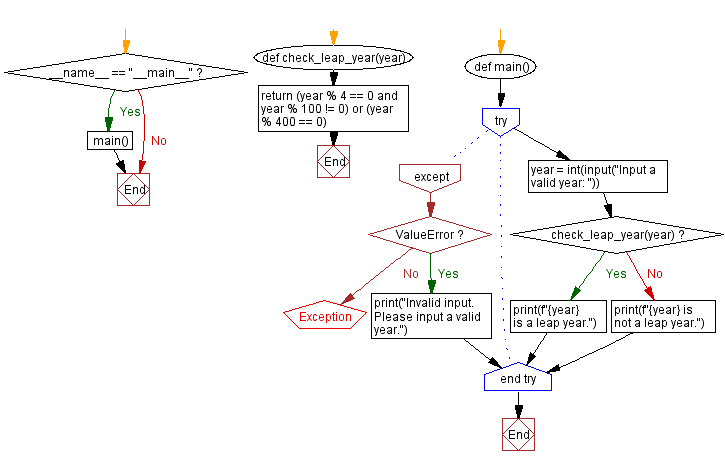Python leap year checker using Boolean logic
5. Leap Year Validator
Write a Python program that checks whether a given year is a leap year or not using boolean logic.
Sample Solution:
Code:
def check_leap_year(year):
return (year % 4 == 0 and year % 100 != 0) or (year % 400 == 0)
def main():
try:
year = int(input("Input a valid year: "))
if check_leap_year(year):
print(f"{year} is a leap year.")
else:
print(f"{year} is not a leap year.")
except ValueError:
print("Invalid input. Please input a valid year.")
if __name__ == "__main__":
main()
Output:
Input a valid year: 2000 2000 is a leap year.
Input a valid year: 2021 2021 is not a leap year.
In the above exercise the above program prompts the user to input a year and then uses the "is_leap_year()" function to determine if the year is a leap year or not. It prints the appropriate message based on the results.
Flowchart:

For more Practice: Solve these Related Problems:
- Write a Python program to determine if a given year is a leap year using boolean expressions and output an appropriate message.
- Write a Python function to check leap year status based on divisibility rules (divisible by 4, not 100, unless divisible by 400) and return a boolean result.
- Write a Python script to test multiple years for leap year status in a loop and print each year along with whether it is a leap year.
- Write a Python program to validate a year’s leap status and then compute the number of days in February for that year using boolean logic.
Go to:
Previous:Python list empty check using Boolean logic.
Next: Python palindrome checker with Boolean logic.
Python Code Editor :
What is the difficulty level of this exercise?
Test your Programming skills with w3resource's quiz.
